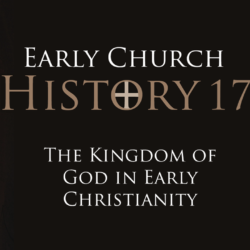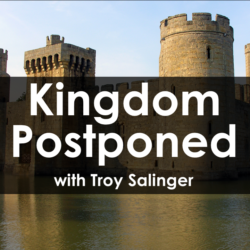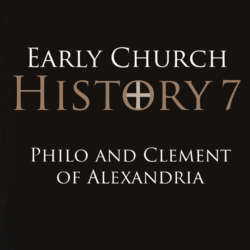 Now that you’ve seen the historical defenders of the kingdom faith, it’s time to turn our attention to those who fought against it. Over the next three lectures you’ll learn the main reasons why Christianity rejected the kingdom message of the bible and replaced it with going to heaven or hell at death. First up, we’ll take a tour of how the ancients thought about creation and the universe, giving special attention to how Plato and Philo influenced Christian thinking.
Now that you’ve seen the historical defenders of the kingdom faith, it’s time to turn our attention to those who fought against it. Over the next three lectures you’ll learn the main reasons why Christianity rejected the kingdom message of the bible and replaced it with going to heaven or hell at death. First up, we’ll take a tour of how the ancients thought about creation and the universe, giving special attention to how Plato and Philo influenced Christian thinking.
This is lecture 11 of the Kingdom of God class, originally taught at the Atlanta Bible College. To take this class for credit, please contact ABC so you can do the work necessary for a grade.
Notes:
Kingdom Called Crude
Dionysius of Alexandria (d. 265)
“But since they bring forward a certain work of Nepos, on which they especially rely as irrefutably proving that the kingdom of Christ will be on earth…we should…examine and correct whatever appears to be unsoundly composed…But when a book is published which seems most convincing to some and do[es] not allow our simpler brethren to have high and noble thoughts, either regarding the glorious and truly divine coming of our Lord or our resurrection from the dead or our gathering together unto Him and being like to Him, but persuade them to hope for the small and mortal and such as are of the present in the Kingdom of God…then it is necessary that we, too, argue with our brother Nepos as if he were present.” (Eusebius, History of the Church 7.24)
Origen of Alexandria (d. 253)
“Because of this it happens that certain of the simpler Christians, since they do not know how to distinguish and to keep separate what in the divine Scriptures must be allotted to the inner man and what to the outer man, misled by the similarities in the designations, have turned themselves to certain foolish stories and vain fictions, so that even after resurrection they believe that corporeal foods must be used and drink taken not only from that true Vine which lives forever, but also from vines and fruits of wood.” (Comm. of the Song of Songs, Prologue)
Eusebius of Caesarea (d. 339)
“Among these he [Papias] says that there will be a period of about a thousand years after the resurrection of the dead, when the kingdom of Christ will be established on this earth in material form. I suppose that he got these ideas through a perverse reading of the accounts of the Apostles, not realizing that these were expressed by them mystically in figures.
For he appears to be a man of very little intelligence, to speak judging from his books, but he was responsible for the great number of Church writers after him holding the same opinion as himself, who proposed in their support the antiquity of the man, as, for instance, Irenaeus and whoever else appeared to hold similar views.” (Church History 3.39)
Augustine of Hippo (d. 430)
“The same Evangelist John has spoken of these two resurrection in his book which is called the Apocalypse, but in such a way that some of us have not understood the first of the two, and thereby have turned it into some ridiculous fancies….Those who, because of this passage in this book, have suspected that the first resurrection is future and bodily…This opinion would be somewhat tolerable, if the delights of that Sabbath to be enjoyed by the saints were, through the presence of the Lord, of a spiritual kind. For we too were at one time of this opinion.” (City of God 20.7.1)
“If we were to tell those pagan philosophers that our bodies are going to be victorious on a new earth and not in heaven, we would be speaking boldly and rashly, yes, even against the faith. For we ought to believe that we are going to have such bodies that we shall be wherever we wish whenever we wish.”(Sermons, Maurist Edition 242.5)
What was the rationale among educated Christians that caused them to regard living forever on a renewed earth intellectually offensive?
Plato’s Timaeus
- eternal realm of immutable forms/ideas
- creator (demiurge) looks to the eternal realm and uses it as a blueprint to make our present universe (a copy)
- change is inferior to stability
- distinction between “what always exists having no beginning” and “what is always becoming but never being” (Tim. 28a)
- “as being is to becoming, so is truth to belief” (Tim. 29c)
- the creator is neither malevolent nor incompetent but a good craftsman who makes the best possible world (Tim. 30a)
Philo’s On the Creation of the World
- significantly influenced patristic thinkers
- reworked Plato’s old creation story to fit with the Genesis account
- he wanted to resolve tensions between his own biblical account of creation and the one composed by Plato
- On the Creation of the World
“the earth and water have been assigned the lowest situation in the universe” (Laws 1.94)
educated people of faith In the first century were under pressure to conform to hellenistic standards
Gnostics
- borrowed from Timaeus
- more dualistic: good spiritual realm vs. evil material realm
- the One is “the unchangeable voice…unique, incorruptible” who gives instruction “about the coming end of the realm” and “the beginning of the coming realm, which does not experience change” (First Thought)
- The few who have received such knowledge are the only ones worthy of “thinking of my unchangeable eternal realm” (ibid.)
- Sophia created without her partner producing a shadow that became matter
- Her offspring was “a product in the matter like an aborted fetus” (Reality)
- Ialdabaoth, the child of Sophia, was the demiurge who crafted the material order with ignoble intent.
- the true seed are able to “trample under foot death…and they will ascend into the limitless light, where this posterity belongs” (Reality 97.5-7)
2nd-3rd c. Philosophers
- many other philosophers also held to Plato’s idea of a higher immutable realm superior to this lower transient world
- Plato’s cosmology played a role in the philosophy of second and third century thinkers including Gaius, Albinus, Maximus of Tyre, Severus, Numenius of Apanea, Harpocration of Argos, Hermes Trismegistus, Plotinus, and Porphyry
- Plotinus’ Neo-Platonism became particularly influential on Christianity
Paula Fredriksen
“In the imagined architecture of the ancient cosmos, the earth stood at the center of the seven planetary spheres, at the furthest remove—spatially and ontologically—from the regions of increasing stability and harmony that stretched from the moon upward toward the planets and the realm of the fixed stars. Such a worldview is prejudiced in favor of the ‘upperwordly’ and spiritual”
What does cosmology have to do with eschatology?
- “The Lord says, ‘Behold, I will make the last things as the first’” (Barnabas 6.13)
- “For the end will be where the beginning is” (Gospel of Thomas 18)
- “For the end is always like the beginning” (Origin, De Princ. 1.6.2)
- Generally speaking, elite Christians submerged in the Hellenistic milieu of the imperial period “knew” that transience was inferior to stability and that the present cosmos was inferior to the higher realm.
Joseph W. Trigg
“Their [the world’s and the human body’s] materiality, which made them subject to change, kept them from being an ultimate good because what is ultimately good is always the same.”
Paual Fredriksen
“Many thinking Christians from the second century onward could not take seriously the proposition that lower, material reality was the proper arena of redemption…their grasp of the principles of philosophy made claims to physical redemption seem incoherent and ignorant, these Christians repudiated the idea of a fleshly resurrection and a kingdom of God on earth.”
Eschatology is influenced by cosmogony and cosmology; how one conceives of the origin and present condition of the universe alters one’s belief about the end.
Read my paper from the 2012 Theological Conference (including proper citations for all quotes above) or watch the video
Links:
- Other Restitutio podcasts and posts on the kingdom of God
- visit KingdomUprising.com for more resources on the kingdom
- check out Anthony Buzzard’s The Coming Kingdom of the Messiah and Greg Deuble’s They Never Told Me This in Church
- Intro music: “District Four” by Kevin MacLeod. Licensed under Creative Commons: By Attribution 3.0 License.







Thank you Sean, good review . My comment is let’s not surcumb to the science so called science of today. While it’s true we should be good stewards of the earth. We. Should take care of what God has given us? However God is not dependent on us and our care, for he is in charge and has set up the world as he pleases and he will make it all new with out us.?.